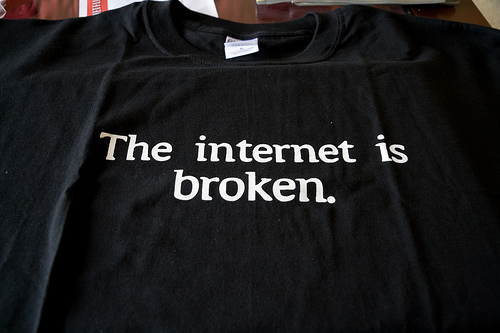Is the Internet Broken?
Is The Internet Broken?

After using the Internet for many years and being fascinated with all the information available online, I find myself asking: Is The Internet Broken? Not in the sense that you cannot still connect to the Internet and do a useful search via a search engine about an abstract topic, find information about a car you are considering buying, connect to friends and family on a social networking site, etc. In that regard, the Internet seems to work as well as it always has, perhaps even better. I mean broken in the sense of not being able to set your settings on websites the way you want them to be set, so websites present data to you in the way you want it presented, or being unable to update information on a website to change your user profile and contact information. I also mean broken in regards to not being able properly change the way websites communicate with you. In many cases, regarding settings and communication, the Internet appears to be broken.
How The Internet Is Broken
I can only speak for myself when I say that there have been numerous times where I have tried to update my settings on Internet websites such as Facebook and Yahoo or tried to change my preferred method of communication on sites such as LinkedIn, only to find my efforts to be rebuffed, despite completing the required steps to implement the change and in some cases even receiving confirmations that the requested changes were made. I found out soon after making the desired changes that the changes were not made as requested and the status quo continued.
It appears to me that to a certain degree, the Internet is broken, at least it is on some popular websites. For example, Facebook allows you to sort your newsfeed to show Highlighted Stories First or Recent Stories First. As I would rather read Recent Stories First, since I have no idea what methodology Facebook uses to determine what Highlighted Stories are, I choose the Recent Stories First. Instead of Facebook saving my preference for Recent Stories First as a default, Facebook defaults back to Highlighted Stories First, requiring me to take action to change my settings every time I log onto Facebook. The wonders of 21st Century Internet technology!
Yahoo is no better in regards to saving preferences. Having tired of receiving emails from Yahoo Groups that I rarely frequent, I logged into Yahoo and changed my settings to never receive emails from Yahoo Groups. The change appeared to work at first, but then reverted to the original setting, and the Yahoo Groups emails once again started bombarding my in-box. Something is broken Yahoo, please fix it!
LinkedIn is another website that despite all of its glitz does not appear to have its technology backend in proper working order. When I decided to change the email associated with my LinkedIn account, I thought it would a simple task of logging in and changing my email address. It seemed simple and straight forward enough. No such luck. The change in my email setting sort of took effect with bizarre results. Now various emails from LinkedIn are sent to either my old or new email accounts with no rhyme or reason. It appears that the email update did not take effect in all of LinkedIn’s databases. Does LinkedIn realize they have broken databases or user information updating applications?
Another problem I have with using LinkedIn is that although I am logged in, the site sometimes requires me to re-login to perform some functions. That is just cumbersome and time consuming. Is this really the best that LinkedIn can offer its users?
Then there is a financial website that I use that kept sending me letters via snail mail to update my email address to a current one because they could not communicate with me via email. Despite updating my email address numerous times on their website, the snail mail continued to arrive notifying me that I had to make a change to my email address. Finally, it was explained to me that there are two places where my email address needed to be updated, which solved the problem. However, this was not included in the snail mail letter requesting an updated email address and was not intuitively obvious when using the website's user information update page. Why do two email entries need to be made by an Internet user anyway? Can't databases be linked on the back-end to make using the Internet easier?
Will The Internet Remain Broken?
The thing that is really frustrating about these broken aspects of popular websites on the Internet is that instead of doing some housecleaning and fixing problems regarding how their websites work and deal with setting changes, these well known Internet companies appear to focus their efforts on developing new functionality for their websites. It is usually great to have new functionality on websites (not always, new is not always better), but to do so while leaving basic applications in a state of disrepair is hard to understand. Their websites have broken applications and functionality, and they do not even appear to care or be working to fix the problems.
The big web titans that do not mind running websites that have broken features and backends are just begging to be taken out by more savvy upstart competitors that actually care about the functionality of their websites. Hopefully, customer complaints and good old competition will eventually force the web giants to fix the broken features on their websites. There is no reason why the Internet should remain broken.
Is The Internet Broken? Share Your Experiences
Is The Internet Broken? Feel free to share any of your experiences regarding broken Internet features in the comments section below.
Google Has Broken The Internet Again
© 2012 John Coviello








